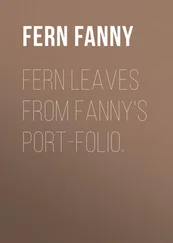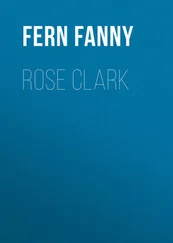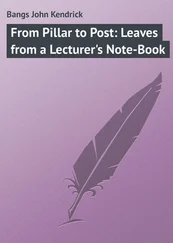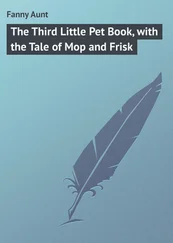Fanny Fern - Fresh Leaves
Здесь есть возможность читать онлайн «Fanny Fern - Fresh Leaves» — ознакомительный отрывок электронной книги совершенно бесплатно, а после прочтения отрывка купить полную версию. В некоторых случаях можно слушать аудио, скачать через торрент в формате fb2 и присутствует краткое содержание. Жанр: foreign_antique, foreign_prose, на английском языке. Описание произведения, (предисловие) а так же отзывы посетителей доступны на портале библиотеки ЛибКат.
- Название:Fresh Leaves
- Автор:
- Жанр:
- Год:неизвестен
- ISBN:нет данных
- Рейтинг книги:5 / 5. Голосов: 1
-
Избранное:Добавить в избранное
- Отзывы:
-
Ваша оценка:
- 100
- 1
- 2
- 3
- 4
- 5
Fresh Leaves: краткое содержание, описание и аннотация
Предлагаем к чтению аннотацию, описание, краткое содержание или предисловие (зависит от того, что написал сам автор книги «Fresh Leaves»). Если вы не нашли необходимую информацию о книге — напишите в комментариях, мы постараемся отыскать её.
Fresh Leaves — читать онлайн ознакомительный отрывок
Ниже представлен текст книги, разбитый по страницам. Система сохранения места последней прочитанной страницы, позволяет с удобством читать онлайн бесплатно книгу «Fresh Leaves», без необходимости каждый раз заново искать на чём Вы остановились. Поставьте закладку, и сможете в любой момент перейти на страницу, на которой закончили чтение.
Интервал:
Закладка:
Trivial? Did you ever live for a series of years with your head in a trunk? Did you ever see your ghost-like habiliments dangling day after day from pegs in the wall? Did you ever turn away your disgusted eyes, as the remorseless chambermaid whirled clouds of dust over their unprotected fabrics? Did you ever, as you lay in bed of a morning, exhaust your ingenuity in devising some means of relief? Did you ever, exulting in your superior acumen, rush out, and purchase at your own expense, a curtain to cover them? Did you ever jam off all your finger nails trying to drive it up? (for what woman ever yet hit a nail on the head?) Did you ever have that dusty curtain drop down on your nicely-smoothed hair, nine times out of ten when you went to it for a dress? Did you ever set fire to it with a candle, when in an abstracted state of mind?
Trivial? Did you ever implore a white-aproned waiter, with tears in your eyes, and twenty-five cents in your hand, to bring you an empty cigar-box to keep your truant slippers in? Did you ever stifle with closed windows, because if you threw them up, you would throw out your books, which were piled on the window lodge? Were you ever startled in the middle of the night, by the giving way of a solitary nail, on which were hung a bag of buttons, a bag of hooks and eyes, a child’s satchel, a child’s slate, a basket of oyster crackers, a bag of chess-men, and – your hoops?
Trivial? Did you ever partially carry out the curse which was passed on Eden’s tempter, the serpent, as, with a long-handled umbrella, you explored, for some missing shoe, the unknown regions under the bed? Did you ever sit on your best bonnet? Did you ever step into your husband’s hat? Did you ever tear a zig-zag rent in your favorite dress, and find, on looking for pieces of the same to mend it, that you had given them away to your washwoman, with other uncounted needfuls, because you had no place to keep them? Did you ever stand in dismay over your furs and woolens in spring, and your muslins, grenadines, and bareges, in autumn?
Trivial? Ah! – you never witnessed the cold-blooded indifference with which hotel-keepers, and landlords generally, shrug their shoulders, as surveying your rooms, and taking a coup d’œil your feminine effects, you pathetically exclaim, with dropped hands and intonation – “No closets!”
A FEMININE VIEW OF NAPOLEON AS A HUSBAND
It is said that writers of books seldom read many. The “Confidential Letters of Napoleon and Josephine” had not been published when that remark was made. The Napoleon-mad author, Mr. Abbot, says, in his Preface: “We are familiar with him as the warrior, the statesman, the great administrator – but here we behold him as the husband, the father, the brother, moving freely amid all the tender relations of domestic life. His heart is here revealed,” etc. I suggest to Mr. Abbot (for whom, apart from this extraordinary hallucination, I have a great respect), the following amendment of the above sentence, viz.: his want of heart is here revealed; but let that pass.
I have devoured the book at a sitting, and it has given me, as do stimulants generally, mental or otherwise, a villainous headache. With the sad fate of the peerless Josephine fresh in my mind, I read with an impatient pshaw! the burning billet-doux, addressed to her by the man who could coolly thrust her aside for his mad ambition. Hear what he once said:
“Death alone can break the union, which love, sentiment, and sympathy have formed. A thousand and a thousand kisses.”
Also,
“I hope very soon to be in your arms; I love you most passionately ( à la fureur ).”
Also,
“I hope in a little time to fold you in my arms, and cover you with kisses burning as the equator.”
Also, this consistent lover begs from her whom he afterward deserted,
“Love without bounds, and fidelity without limit .”
How very like a man!
Well, I turned over the pages, and read with moistened eyes, for the hundredth time, the wretched state farce enacted at the divorce; and with fresh admiration perused the magnanimous and memorable reply of the queenly Josephine, to the brilliant but cold, intellectual but selfish, imperious yet fascinating Napoleon. Ah! then I would have led away his victim, spite of herself, out of sight, sound, and hearing of this cold, cruel man, who, when it suited his whim, caprice, or convenience; who, when weary of the tame, spiritless Maria Louise, returned secretly to the intoxicating presence of the bewitching Josephine; whom, though repudiating, he yet controlled, down to the lowest menial in her household, down to the color of their jackets and hose; quite safe, in always appending, with gracious condescension, permission “to please herself,” to one whose greatest pleasure, he well knew, was to kiss his imperial shoe-tie.
My love and pity for her merge (momentarily) into contempt, when she abjectly begs for the crumbs of his favor, that fall from happier favorites; for (to quote the touching words of her who would have shared his exile had not death prevented, when the woman for whom she had been cast aside, by a retributive justice, deserted him in his extremity) “he could forget me when he was happy !” Ay, it was when pleasure palled, when friends proved false, when the star of his destiny paled, when he needed the noble Josephine, that he sought her.
And she ? When pealing bells and roaring cannon announced to France that her rival had presented her husband the long-desired heir; she , upon whose quivering heart every stroke of those joyous bells must have smitten like a death-knell; she , the deserted wife, hung festal wreaths over the grave of her hopes, gave jewels to the messenger who brought her the news of his happiness, and ordered a fête in honor of the young heir. Match me that, who can, in the wide annals of man’s history? But, oh! when midnight came on, and garlands drooped, and bright eyes closed, and tripping feet were stilled, when the farce was played out, and the iron hand of court etiquette was lifted from off that loving, throbbing, bursting heart, it thus poured itself out to Napoleon:
“She (Maria Louise), can not be more tenderly devoted to you than I; but she has been enabled to contribute more to your happiness, by securing that of France. She has then a right to your first feelings, to all your cares; and I, who was but your companion in times of difficulty, I can not ask more than a place in your affections far removed from that occupied by the Empress Louise. Not till you shall have ceased to watch by her bed, not till you are weary of embracing your son, will you take the pen to converse with your best friend. I will wait. ”
The answer to the touching letter, from which this is an extract (and every woman with a heart, who reads it, can measure the height and depth of its anguish), was the following verbal , the following delicate message, through Eugene!
“Tell your mother I would have written to her already, had I not been completely absorbed in the pleasure of looking upon my son .”
About eleven o’clock that evening she received the much-coveted line from his own hand; in which he seemed to have been able at last to remember somebody beside himself; and for which the all-enduring, all-forgiving Josephine adores as a god, “the man who, when he willed , could be the most delightful of men.” Nobody will deny the matchless tact of the lines which dried poor Josephine’s tears:
“This infant, in concert with our Eugene , will constitute my happiness, and that of France.”
But the man “who could be so delightful when he willed,” did not, any more than the rest of his sex, always will it. Motes and butterflies seek the sunbeams, and the friends of poor Josephine’s happier days, forsook her for those whom Fortune smiled upon. Malice, always on tiptoe to whisper into the tortured ear, told her of the “happiness” of the inconstant Napoleon; and with the birds, flowers, and fountains of Malmaison mocking her tears, her crushed heart thus sobs itself out to the emperor:
Читать дальшеИнтервал:
Закладка:
Похожие книги на «Fresh Leaves»
Представляем Вашему вниманию похожие книги на «Fresh Leaves» списком для выбора. Мы отобрали схожую по названию и смыслу литературу в надежде предоставить читателям больше вариантов отыскать новые, интересные, ещё непрочитанные произведения.
Обсуждение, отзывы о книге «Fresh Leaves» и просто собственные мнения читателей. Оставьте ваши комментарии, напишите, что Вы думаете о произведении, его смысле или главных героях. Укажите что конкретно понравилось, а что нет, и почему Вы так считаете.












